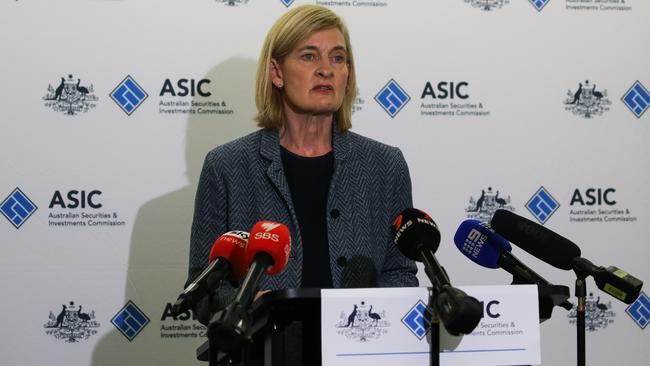Court loss: Union Standard International Group ‘pressured’ customers into risky punts
Customers who claimed they were pressured into punting on risky trading products have been vindicated after ASIC won a mammoth case against an Australian foreign exchange trader.

English football club Sheffield United’s former sponsor and forex trader Union Standard International Group broke the law, including by pressuring customers to deposit more money into trading accounts to make risky bets and a broader system of unconscionable conduct, a court has ruled.
Four years after the Australian Securities and Investments Commission accused three Australian companies – Union Standard International Group, EuropeFX and TradeFed – of breaching the Corporations Act, Federal Court Judge Michael Wigney largely agreed.
“USG, EuropeFX and TradeFred profited handsomely from their derivatives trading business. Most of their customers did not,” Justice Wigney said.
ASIC alleged the companies gave their customers, many of whom had little or no investment or securities trading experience, with a market and trading platform to punt on “highly risky” contracts for difference (CFDs) and margin foreign exchange contracts (Margin FX Contracts), Justice Wigney said.
“By virtue of its arrangements with EuropeFX and TradeFred, USG generated revenue when its customers and EuropeFX’s and TradeFred’s customers made losses as a result of closing positions that had moved against them,” he said.
One EuropeFX customer, a 33-year-old technician who worked in the remote Pilbara region of Western Australia, initially opened an account with $1000. But within four days, he lost a total of $22,500.
The man gave evidence in the trial and was cross-examined “at length”, Justice Wigney said.
“He had no previous experience in respect of trading in CFDs or Margin FX Contracts. He had, however, previously invested small amounts in cryptocurrencies and had purchased some shares in Apple,” he said.
He ultimately lodged a complaint with the Australian Financial Complaints Authority and got the money back.
Losses suffered by EuropeFX customers for slightly more than a year amounted to $69m in December 2019. And between March 2018 and November 2019, TradeFred’s clients made net trading losses of more than $13m.

ASIC deputy chair Sarah Court said this “outcome sets an important precedent for Australian-based financial services licensees providing services such as margin forex trading to overseas customers under their AFS licence where such offerings are prohibited”.
‘The conduct of licensees providing services to overseas customers under their AFS licences has attracted considerable attention from regulators globally and this judgment is important in protecting the reputation of Australia’s financial services licencing regime,” she said.
USG and TradeFred were wound up before a trial and did not actively defend themselves against the claims, but Justice Wigney noted allegations were “vigorously” defended by EuropeFX although the company ultimately admitted some of the alleged conduct.
ASIC said that between 2017 and 2020, each carried on financial services businesses where USG held an Australian licence and EuropeFX and TradeFred were its corporate authorised representatives.
EuropeFX gave personal advice to customers when it was not licensed to, promoted its services with false and misleading information and breached the Act eight times by “engaging in conduct, in trade and commerce and in connection with the supply or possible supply of services to a person, where that conduct was, in all the circumstances, unconscionable”.
Justice Wigney said account managers “frequently and routinely” gave EuropeFX customers advice about trades they should place.
“The recommendations were frequently accompanied by promises, assurances or at least suggestions about the profits the customers could expect to earn if they carried out the recommended trade,” he said.
“Those recommendations often escalated to the point where the customers were effectively being pushed or pressured to open more and larger trades.
“The customers were also frequently pressured to deposit further money into their trading accounts, either to allow more trading, or to provide necessary margin for their existing positions.”
Against TradeFed, Justice Wigney said he was “comfortably satisfied that ASIC’s pleaded case of systemic unconscionability was made out by the evidence”.
He also found that USG “failed to do all things necessary to ensure that the financial services covered by the licence were provided efficiently, honestly and fairly” by continuing to offer Margin FX Contracts and CFDs to thousands of customers in China.
ASIC’s case had to be pared back, and was “large and complex”, Justice Wigney said.
It involved a “huge” amount of evidence which included statements about the experience of eight former EuropeFX customers.
A hearing to determine relief will be held at a later stage.




To join the conversation, please log in. Don't have an account? Register
Join the conversation, you are commenting as Logout